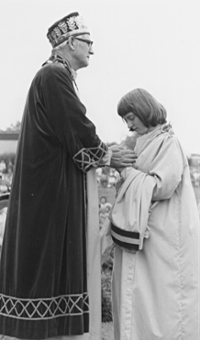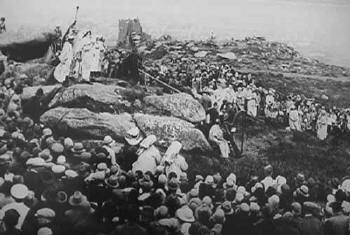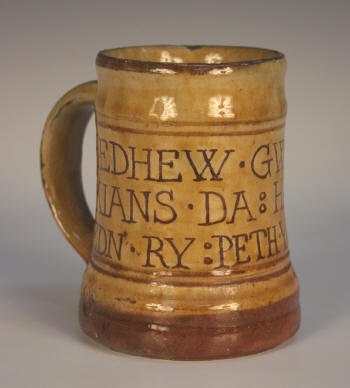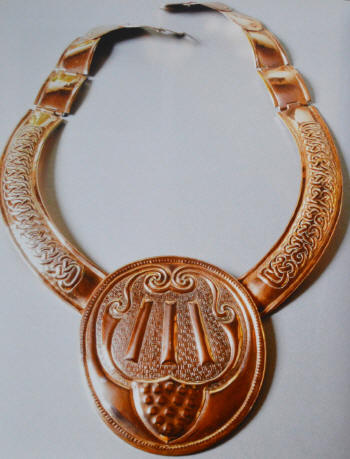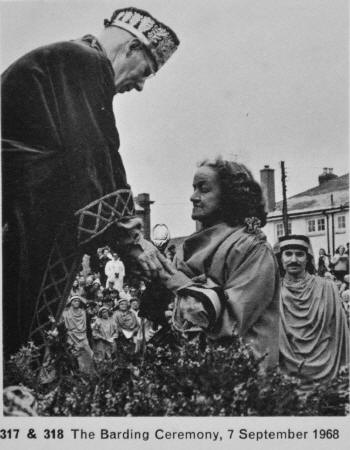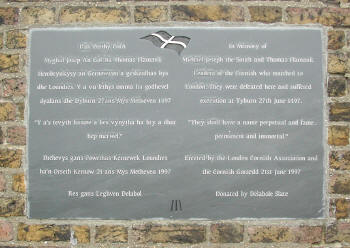|
|
| home | features | exhibitions | interviews | profiles | webprojects | gazetteer | archive |
|
Ann Trevenen Jenkin on the Cornish language, Cornish Gorsedd and Mebyon Kernow Cornish language speaker, Ann Trevenen Jenkin, was a founder member of Cornish political party, Mebyon Kernow, and first female Grand Bard of the Gorsedd. Interviewed by Rupert White at her home in Leedstown.
Much of your 'Cornish activism' was in partnership with your husband Richard. How did you meet each other?
Mebyon Kernow formed in 1951. I was at school until 1949 in Cornwall, and then went to the University College of the South West, Exeter which later became Exeter University. Richard used to write letters to me in Cornish. We did Cornish language together at University: there was a Celtic society, and there were a lot of Cornish people there then, as it was the nearest university. My husband went there for one year to do his teacher training, having started his degree at Oxford. Mebyon Kernow was formed in Oates Hotel in Redruth. There were several other meetings but the formation meeting was in the hotel. We didn't really know what we were doing! We were young and idealistic at the time.
Where did the name come from? We’d already discussed and agreed this. There were one or two comments that it means 'Sons of Cornwall'. Us women said 'what about us? we're women!' and the response was 'Don't worry - 'sons' is a broad generic term!'
Which seems ironic given that Helena Charles was the first leader of the party... Yes. She lived in a very dilapidated cottage in St Day. Richard and I used to go out to see her and talk about it. She came from a Helston family called the Tyackes, as I did. We were relations. She worked in London during the war and came back and thought that Cornwall needed new leaders, which it still does.
When you started learning Cornish, was it Jenner’s work that was most important? My husband was more of a researcher than I was, so at that time he understood the background more than I did. I was conscious of being Cornish. My family (Trevenens) were important with setting up the mines in the 18th century, and the Cornish Copper Company in Hayle. Matthew Arnold’s grandmother was a Trevenen, and his mother was a Penrose. Matthew Arnold wrote an influential book about Celtic Literature. He knew he was Celtic. His family came to Cornwall and he realised he was home. His grandmother kissed the ground when she crossed the Tamar into Cornwall. Jenner was a later influence, but for me, Robert Morton Nance was more important, as he was alive and active when we returned to Cornwall form university, and I learnt some of my Cornish from him.
MK had a broad cultural base. My husband was keen to see it as a broad-ranging party: political, cultural linguistic leaders. Not really political with a capital P, though this was always our underlying dream. We were laughed at for speaking Cornish. I remember going to a pub in Mithian with Richard and two or three others, and we were talking Cornish in a pub and people were laughing at us. I used to teach Cornish at lunchtime in my own time at the school in Camborne, and a lot of the children treated it as a joke, but many were keen to learn and some including our son Conan, did CSE in Cornish. It was difficult in the beginning. A lot of the leaders of the Celtic Congress and MK were out of Cornwall doing our degrees. We weren't physically in Cornwall except during holidays because there was nowhere down here to go on to in terms of further education. The numbers of MK, Celtic Congress, new bards in the Gorsedd were very low, and the same people were in about six societies trying to keep them all functioning. And we had very little opportunity to speak Cornish because we weren't living near each other. Dick Gendall, Richard and I, Helena were all in different places. Retallack Hooper was in Camborne and George Pawley White in Callington. Lambert Truran in Redruth was an activist, and he emigrated later on. This was the group that was most active in the Cornish movement then. Morton Nance kept his distance from MK in a sense. He didn’t speak against it. Morton Nance was older and a different generation. It was after the war, and people had been scattered by the war. The war changed people's perceptions and particularly women’s roles. They became leaders and it gave them more opportunities for leadership.
There were less women in the pre-war early days of the Cornish Revival? Yes, though Annie Pool and Katherine Lee Jenner come to mind. Katherine was an artist.
How did you personally become involved in the Gorsedd? I learnt Cornish. I knew Morton Nance because when I finished school in 1949 I used to go down to Carbis Bay with Helena Charles to see Morton Nance for lessons in Cornish with him. Helena was a very good linguist who knew Hebrew and other languages.
Yes, and later there was criticism that it was all ‘stuck up people who know-it-all and they shouldn’t be the leaders. They're not the real grass roots Cornish out cutting the cauliflower or whatever’. But it’s improving now. I was not a good linguist really. All you had to do to become a bard in 1957 was to write an essay of 500 words in Cornish and you could use dictionaries. Years later when I was teaching Cornish I did the exams again and I got better. I got to know Nance through the Celtic Congress too, because he was chair and I was on the committee. He wrote a letter to me saying ‘You’d be a very good bard Miss Trevenen – you just have to write 500 words’ so I did it and became a bard in 1957 (picture top right). My husband had become a bard in 1947. He taught himself Cornish using books in Manchester City Library.
The Gorsedd ceremony was originally based on the Welsh Gorsedd... Yes. It was set up by the Welsh Gorsedd and in 1928 a number of people were made bards at the Welsh Gorsedd so they could come back and establish the Cornish one a few months later.
And so the ceremony is based on the Welsh one but its been tweaked over the years presumably? Its a bit different. We sing 'Hail to the Homeland' in Cornish now. We still sing 'Land of My Fathers' which is the same tune and words in the different languages of Brittany, Cornwall and Wales. It hasn't changed all that much. Its very difficult to know how much it should change.
Both ceremonies feature Excalibur? Yes. It’s referred to as the 'Sword of Arthur' in the Gorsedd. And the oath includes a reference to Arthur returning to save his people in the form of a chough. The Awen (three lines - like rays of the sun) is used by all three as the symbol of inspiration for the Gorsedd.
Coming on to the bards themselves, Nance and the Leach were very friendly, and one of Nance's sons married Leach’s daughter. There were lots of close links with the artist community. I knew Peter Lanyon. He would have known them all too. He was made a bard in 1961, so quite an early one.
Michael Cardew, the potter, was in that first group of bards and became a Cornish speaker (picture above right is pot by Cardew). But Leach didn't become a bard until the 70's - a little after Barbara Hepworth (picture below right) which is interesting.
The earliest Cornish bards were made in Wales as early as 1899. John Hobson Matthews from St Ives and the two Reynolds, then Jenner in Brittany in 1903, then Katherine Lee Jenner and Duncombe Jewell in 1904. We’re now getting Bretons learning Cornish, and even people in Czechoslovakia.
Another craftsman-bard, Frances Cargeeg, made the copper ware used in the Gorsedd (Grand Bard breast-plate bearing the Awen, picture left). He was a lovely man, whom I knew. He was a very strong influence because of his copper ware and he was thoroughly proud of being Cornish. After the war a lot of the Cornish activists really wanted to consolidate their lives in Cornwall having lived through some horrible experiences in the war. When I was a student in London I had a friend who was half German and half American who said I was so lucky because I belonged somewhere. This feeling was important for people coming out of the war.
And people who felt rootless wanted to put down roots, so were having to reinvent themselves and start again. The art movement after the war was very important part of this. In St Ives and Penzance in particular. People wanted something creative to enjoy and look forward to, whether painting and art, music, creative crafts or Cornish language. There was this sense of needing to rebuild things.
Nance was always keen to say that the Gorsedd was not political. I was young in the war. I was 9 when it started. All the men at University had done National Service and were a bit older. I was very innocent then. I had to be careful when I was Grand Bard, because it’s non-political, but nearly all the Grand Bards have been members of MK. My daughter is on Cornwall Council. Dr Loveday Jenkin. We all feel that you have to stress that you do the best that you can for Cornwall. It’s very difficult to know what they're up to in Westminster and the money doesn't seem to be fairly distributed, so Cornwall often feels neglected by central government.
There were a few journals in post war period that you were also involved with... 'Cornish Nation' was the MK journal, 'An Lef Kernewek' was the language one, done by Retallack Hooper in Camborne, and my husband and I did 'New Cornwall' for a good many years. Helena Charles started it and moved out of Cornwall and we carried it on for about 15 years until I baulked and said ‘I’m working now and have four children’!! We were joint editors, and they’re interesting to read now. Richard used to duplicate them in the shed with an old style Gestetner, and by then I was back teaching when he was still doing them in the 70’s and it was a very inky, messy job. The magazine was supposed to be broad-based: culture, language, politics, everything. I did a series on Cornish artists at one point.
Can you talk about some of the projects you have been involved with in more recent years, as well as your time as the Grand Bard? I set up the Holyer an Gof awards for publications about Cornwall, which I ran for 14 years single-handedly. We published the 'Millennium Book - Kernow Bys Vyken' as well.
When I became the first woman Grand Bard I thought I had to be better than the men because some people didn't want a woman! It was hard work. I travelled to over 1,000 events during my three years. There's a big Cornish community in Australia, and there’s the Cornish-American Heritage society which is quite big but they’re diffuse and scattered. The Australians are well organised. They keep going, and they keep rejuv-enating themselves. I also organised a couple of overseas Homecomings for the emigrant Cornish after I finished. The Gorsedd is about keeping Cornish Culture, language and identity going. Working for Cornwall and fighting for Cornwall’s minority status, the boundary between political and non-political is blurred so it’s very easy to get told off for this by someone. We find it very difficult. We’ve just had nominations for bards this September. There were 43 nominations, but how do you choose people who are going to keep Cornish culture or painting or language or archaeology going? My mother who was not Cornish used to laugh at the Gorsedd and say 'I see you’re wearing those old blue curtains again' which cut me down to size! Ann Trevenen Jenkin, February 2015. |
| http://www.gorsethkernow.org.uk/
|

